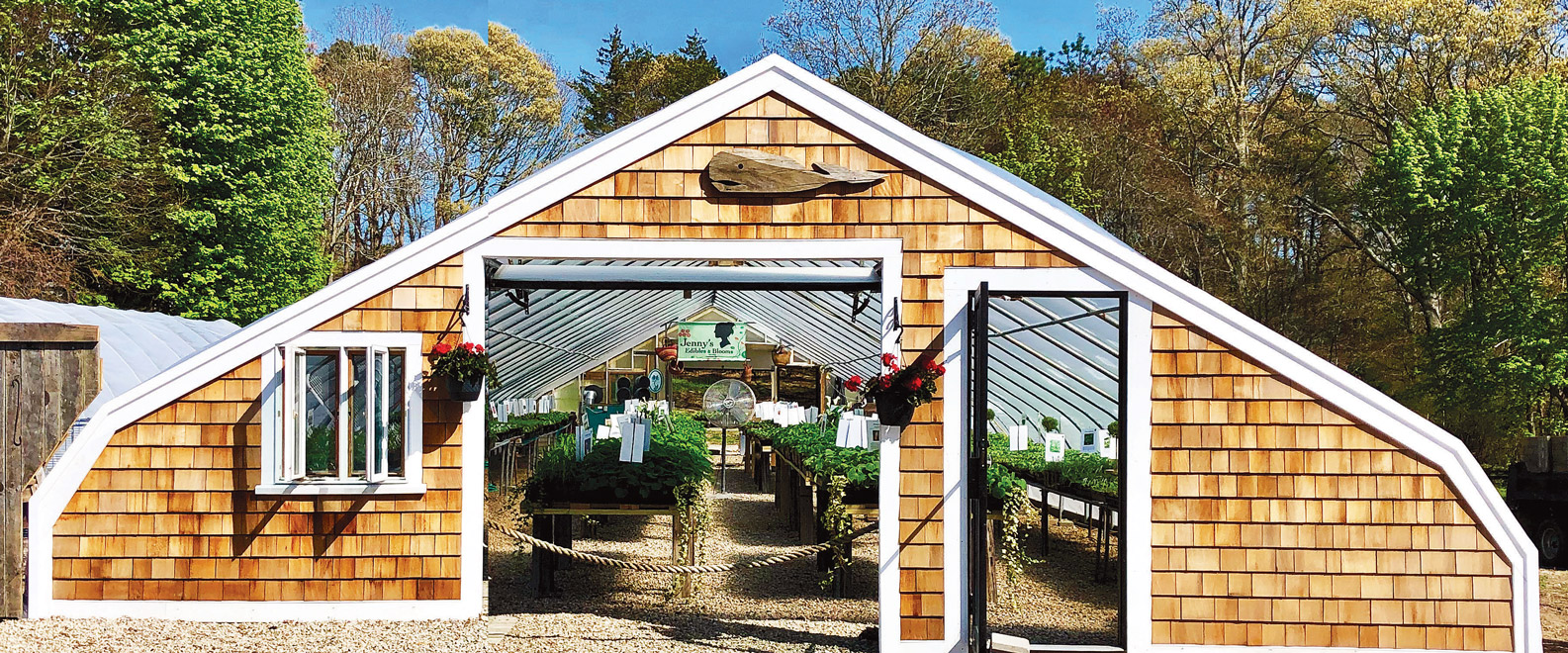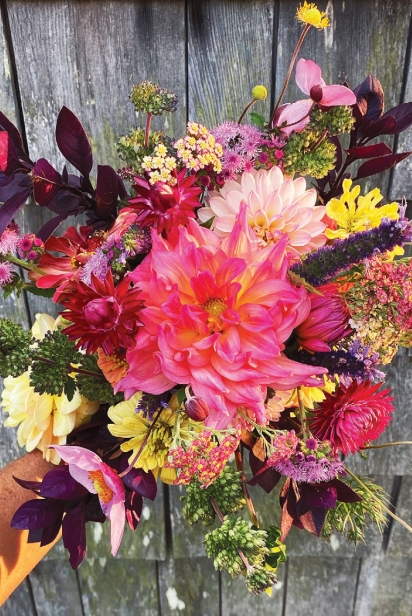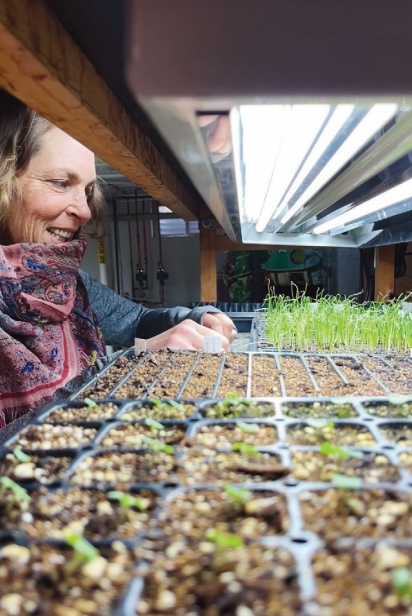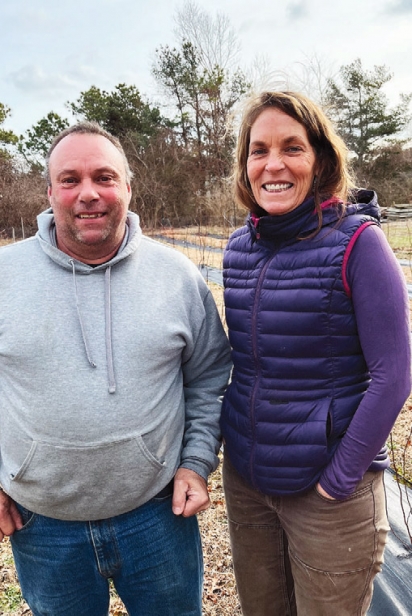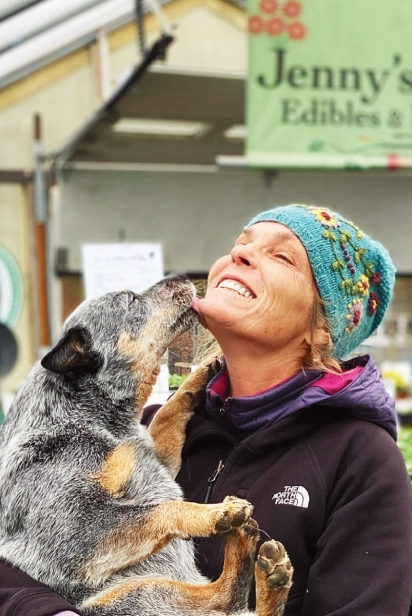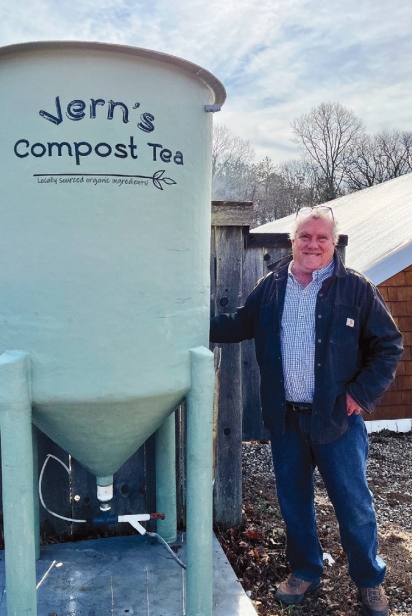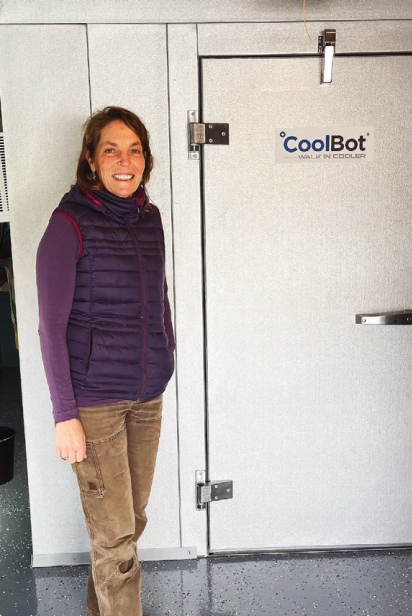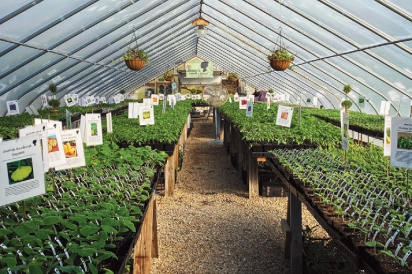Navigating Horticulture: Jenny’s Edibles & Blooms
Jen Irving, a surgical Physician’s Assistant, launched her dive into the world of agriculture a decade ago. In a world where many would be wiped out after a full day of pre- and post-operative patient care, doing surgical consults, and as a first assist in the OR, not her. Irving plowed right in, invigorated at the thought of raising veggies, flowers and herbs organically. Curiously enough, though, her journey began much earlier on a boat.
A young deck hand at the start, Irving rose through the ranks working for SEA, the Sea Education Association, becoming a Captain who would lead crews in sailing tall ships on both the Atlantic and Pacific. Based in Woods Hole, SEA programs guide undergraduate students in experiencing ocean conservation through hands-on research. Voyages brought her as far away as Hawaii and to countries south of the equator on the eastern seaboard. A washashore from Chadds Ford, PA, Irving says, “I loved the adventure, yet after two decades of six to ten months on the ocean each year, I began to realize that I didn’t want to sustain this until I retired.”
“What I considered was a move to another career at the intersection of science and humanity. Because I was responsible for the safety and lives of the crew and students on the vessels I sailed, I had studied and was experienced in Wilderness Medicine. After twenty years at sea, I mulled options and decided my Plan B would be to become a Physician’s Assistant,” says Irving. “It filled the niche. I relocated to DC for two years’ study in 2006, followed by a one-year internship in 2009.”
Three years into this new career at Cape Cod Hospital, Irving launched another in 2012, becoming an organic grower. “Sure, I had raised a few flowers with my mom in our garden growing up, but nothing much. I loved playing in the dirt, and now that I was no longer at sea, it was nice to settle into the seasonality of life. Plus, by then I was a PA in an ICU, where no one is feeling well enough to be very happy to see you,” says Irving. “It was a nice balance; being in the greenhouse with my hands in the soil nourished me.”
Returning briefly to the DC area, Irving did an intensive workshop with an area flower farmer. The bulk of learning, though, has been trial and error. She reads online blogs and posts, keeps good records and values the input of the many flower fanatics that she connects with, one of the perks of membership in the ASCFG, the American Society of Cut Flower Growers. Meryl Gartside is one example; she raises flowers and creates designs out of Blue Lobster Farm in Brewster. “Meryl is a really good friend; we love to pick each other’s growing brains,” says Irving. “I’ve learned so much from collaborating with other local growers.”
What Irving’s absorbed about the business of being a flower farmer is that it takes a while to find one’s audience. She sees the Slow Flowers movement as being just that; slow but improving. “The public is more supportive of food, for the most part, than of flowers. Overall people are generally divorced from knowing what it takes to actually bring a seed of any kind all the way to harvest and then move that product through the supply chain to become flowers or food on someone’s table. The timeframe may actually total up to be a matter of years considering improvements to the soil, sowing seed, planting, watering, and harvesting,” says Irving. “Yet, once you connect with your people and find your tribe, they like actually knowing the person that you are, the girl who sells them flowers.”
As for working with local florists, Irving sells to several in her hometown. The high carbon footprint of shipping flowers here from around the world, coupled with the poor and often environmentally detrimental working conditions those flower growers and handlers experience, have led many local florists to seek other sources. “Clearly, they need a year-round supply of flowers, but I’m a good resource, at least for several months of the year, of high quality certified American-grown blooms. Most are super excited,” she says, “to find a local source for blooms like snaps, zinnias, celosia and lisianthus.”
Once the final fall flower harvests are complete and the dahlia tubers are pulled for storing, it’s time to analyze successes and losses, and plan for the next year. In mid-January two large storage containers, filled with rows of seed packets, cover a large expanse of a coffee table where she is scheduling new orders to add to her stash. Her carefully constructed annual seeding spreadsheet exceeded 400 line items and was still climbing. “The real rule of thumb is to order bulbs, corms or seeds soon after each one’s final harvest; yet it’s tricky to do that when you’re so busy. I typically trial 100 new varieties of seed each year before deciding which will join the list of what I sell at my annual starter sale in May,” says Irving. “One of my favorite things about growing is that every year you get a do-over.”
Irving’s sale of herbs, veggies and flowers begins in early May and runs until stock is nearly depleted, usually about Father’s Day. Perhaps because of the Covid-generated uptick in gardeners, in 2021 she sold out long before that. “For this sale, I use property my friend Mike Abel leases in Falmouth. It’s very visible, right on Sandwich Road; a great spot for the public to locate,” says Irving. “Abel is incredible and a real animal person, raising pigs, chickens, goats, rescue ponies and even an Emu. He’s great at constructing things too, with a knack for creating just what we may need with cast-offs from other jobs or salvaged from who knows where. He saves everything.”
Abel outfitted the property’s existing but ailing greenhouse with heat by jerry-rigging an old burner and a donated oil tank. Needing more grow space, Irving purchased only metal support ribs and plastic to cover a second greenhouse that they created together. Abel fashioned every other component of the structure with treasures like abandoned doors, fencing, lumber and hardware that he had squirreled away. “He’s amazing. For every problem I face, he’ll come up with something to help,” says Irving, “and fast.”
Abandoned in winter, these two greenhouses will be crammed full come spring. Irving offers hundreds of different kinds of plants for sale, some in 6-packs, and others in pints or larger 2-quart pots, depending on the varieties. Veggies include 30-40 varieties of tomatoes alone, of which the Sun Gold is not only her favorite, but the customers’ choice. “It’s super easy to grow and wonderfully sweet,” says Irving. “And produces a riot of fruit from first harvest through frost.”
Initially started from seed under grow lights and on heat mats in the basement of her home, when large enough, all the plant starts will make their way to the greenhouses to mature. “By the time of the sale, plants that love cooler temperatures will also be spread across rows of tables that I built behind the greenhouses,” says Irving. “I just love how it makes me feel when everyone walks in, sees all the plants and smiles.”
On the final day when selections begin to wane, Irving takes the remaining plants, and delivers them to various places around town. “I want to give back to our community, so most go to the Falmouth Service Center, our town’s non-profit that provides a food bank, fuel assistance, and a thrift shop. The balance goes to local school gardens and summer programs.”
On a bright January morning, a huge plastic vat, at least four feet square and filled with some mystery concoction, resides in the far corner of one of the empty greenhouses. Approaching it, a thin dark brown liquid, covered with layers of froth and foam, nearly bubbles over the rim of its container. This experiment is courtesy of another friend, Bill Mebane. A biologist by training, he worked on a project to support the food supply in Haiti. He perfected raising large volumes of soldier fly larvae that would eventually be incorporated into compost. Once the mature flies had molted, their high chitin-containing shells would be collected. These exoskeletons, a tremendous source of protein, effectively became the nutrition to feed fish that Haitians could later consume.
Mebane is the creator of an aerated compost tea, a magical elixir that keeps Irving’s plants ship-shape. “Even I don’t know the amendments in his top-secret recipe. In January he was already fine-tuning it for this coming summer, testing it for this or that, taking its temperature and adjusting the chemistry. He’ll move it to a big container in front when he’s satisfied with what he’s dubbed ‘Vern’s Tea’. People can drop by all through the summer and purchase it by the gallon.” Irving says, “Pests and diseases just haven’t been a problem for us so far, and all I use is Vern’s Tea.”
Once the big spring sale is over, Irving grows veggies only for her own use and instead focuses on flower production. Selling most to florists as 10-stem single-variety bunches, she also creates mixed bouquets for local supermarkets and sells at a few pop-up events. Rounding out her workload are flowers and floral installations for events including weddings, mostly under 100 guests in size, and raising a handful of edible flowers like nasturtiums, to have at the ready if needed. She also does all her own photography, posts to multiple social media accounts, saves seeds, and creates a weekly newsletter during the growing season.
Until now, Irving has been a one-woman band, relying on volunteers who lend a hand when she’s in the weeds. She has tremendous support from friends and neighbors that help her seed, pot up, and manage the annual sale in exchange for plant starts or flower cutting privileges. This year, Irving admits, “For the first time, I may consider a consistent intern or employee now that I have the added footprint of a recently-built hoop house at my home, plus the expanse of land to raise crops at the property I lease with Abel.”
Back at the Falmouth home she purchased three years ago, Irving’s botanical design sense is imprinted everywhere. Once the initial rehab of the aging house was completed, she designed a magical landscape. A massive boulder retaining wall leans into the hill where the home sits. Gentler walls of smaller stones create layered planting areas that wind throughout the property.
Irving says “Now, while I’m full-time at the hospital, I’m trying to do this heavy lifting while I have the financial resources to make these infrastructure purchases. I’m also taking a 6-week online course to understand pest and disease management in hoop houses with topics like growing from cuttings. In the future, when I may be working less hours, I’ll be set up for my forever job.” As I’m driving off, Irving halts me in my tracks to yank up her garage door. Inside is a silver cube, eight-foot square, and shimmering in the daylight. Her new walk-in cooler nearly fills one lane of the two-car garage. Her CoolBot prefab unit was assembled and installed just days ago. A standard air conditioner is inserted into one of its walls. With a small CoolBot controller attached, it will achieve a temperature much lower than the 60 degrees most air conditioners can reach. Holding flowers at 36 degrees will allow Irving to keep harvested blooms and foliage much longer. Specialty items like peonies can also be cut prematurely and kept there until needed. When returned to room temperature at a later date, they will open; a quality especially important for event work.
“Gardeners are a special breed. I love it that this involves all aspects of my brain. It’s creative, business, color and design, and it connects with science. The novelty and awe just never wear off. A seed; it’s unbelievable just how much genetic information is in these tiny things,” says Irving. “You plant one and then ‘Poof!’”
jennysedibles.com
On Facebook: jennysediblesblooms
@jennysediblesblooms 508-388-3822
Spring plant sale — veggies, herbs and flowers
Opening day: Thursday, May 5th
Open: 9-5 Thursdays-Sundays and Memorial Day until sold out
Green Dragon Farm
225 Sandwich Road, Teaticket


